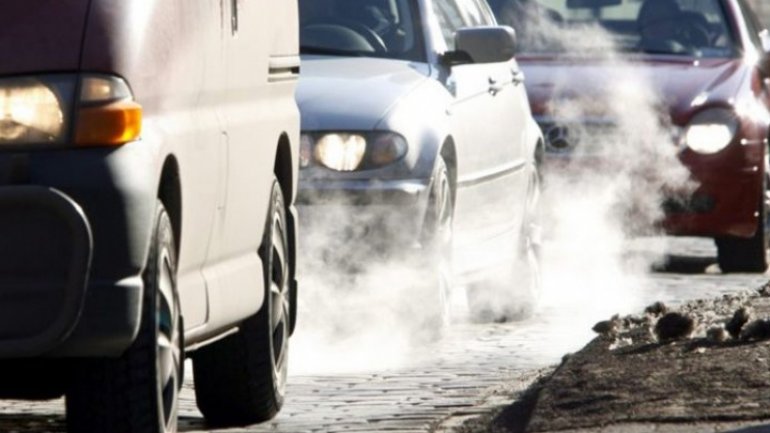Bulgaria's air quality suffers from imports of old diesel cars
 foto: PUBLIKA.MD
foto: PUBLIKA.MD
The air in Bulgaria's capital Sofia is some of the dirtiest in Europe.
In the 2017 air-quality report from the European Environment Agency, Bulgaria ranked eighth in terms of most premature deaths caused by PM2.5, a pollutant caused mostly by fuel combustion, heating and waste incineration.
Bulgaria has for years faced high levels of air pollution in its big cities.
In January this year some of the highest levels of particle pollution were recorded – on some days the air being six times dirtier than the norm.
That's according to a group called AirBG.info, a non-government organisation that gathers information from volunteers who build and maintain their own air quality measuring stations.
AirBG.info now has more than 600 stations across the country and claims its data sets are therefore the most reliable.
Volunteer Petar Kirov says the problem is getting worse and dirty diesel cars are a major cause.
"We showed very high levels of air pollution, not only in the capital but in other big cities like Plovdiv, Varna and Blagoevgrad during the cold months when heating is needed. Also we showed a big problem that is becoming more serious. That is, the problem with the pollution caused by cars with internal combustion engines."
"Bearing in mind that the number of cars in the country is constantly growing, and the quality of automobiles coming into our country, things are becoming more and more worrying. These problems are a fact but no adequate measures are being taken to solve the problem of air pollution caused by cars with internal combustion engines."
Most Bulgarians buy their cars second-hand and imported from Western Europe.
But according to a new report by Brussels-based non-governmental organisation Transport & Environment, many of the diesel cars don't comply with new environmental regulations in Western European countries, which is why more and more sellers are looking to sell them in Eastern Europe.
In Sofia's largest market for second-hand cars, the majority of vehicles have come from Italy, Germany and France.
Last year alone, Bulgaria imported more than 100,000 second-hand cars and more than a third of that number, about 35,000, are grossly polluting diesels, according to the data compiled by Transport & Environment.
The data shows that more than half of the dirty diesels are over 10 years old and without the standard diesel particle filters found on all cars after 2011.
Chairman of the Association of Car Importers Hristo Hristov says the majority of cars in Bulgaria are more than 10 years old.
"Registered automobiles are a little over four million at the moment and those that are over 10 years old are more than 60 percent of all cars. Only about 120,000 are cars that are less than five years old."
"Over 50 percent at the moment we think are with diesel engines, but here I want to add that not all diesel cars are bad for the environment. There are cars with petrol engines that currently are much worse polluters because they are very old," says Hristov.
Hristov points out that Bulgaria is the poorest member of the EU, so cost is a major factor for people when choosing a car.
He believes that in order to tackle the dirty automobile problem, the taxation system needs to change, as Bulgarians currently pay higher taxes for newer vehicles than for older ones.
Stefan Stefanov works for a company that requires regular use of large cars and vans for deliveries and transportation.
He says he doesn't think about pollution when it comes to choosing his next vehicle.
"The main factor is the price and also another thing I've noticed is that for cars that are over 14 years old we actually pay much lower taxes than for brand new cars," he says.
"I can sum it up like this - first the buying price for a diesel car is much better, diesels also are more economical and as a whole the taxation system motivates you to make such a purchase."
Many of the cars that people are buying second-hand in Bulgaria will soon not be allowed on the streets of German cities like Hamburg and Stuttgart, where new bans against the most-polluting diesel vehicles are being introduced.
According to Julian Popov, a fellow at the European Climate Foundation and former environment minister in Bulgaria, this difference in regulations amongst EU countries is creating an asymmetrical pressure on the car market.
He says it means that many of the dirty diesels will find their way onto the streets of Eastern European countries like Bulgaria, Romania, Poland and the Czech Republic and a range of different measures have to be taken to prevent this from happening.
Alongside every municipality and every EU-state introducing regulations to tackle their localised sources of air-pollution, he's calling for a pan-European approach.
"There is east-west divide in the air that we breathe. Usually the air in eastern part of Europe is more polluted than in the western part of Europe. That changes, sometimes it is different but if we go deeper into the data we will see that in cities like Sofia, in Warsaw, in Bucharest, in the last 100 days there have been much more days with exceeding pollution levels, than in Munich or Paris or London, cities that have very, very high awareness of their air pollution. And no, we can't have a United Europe if Europeans breathe different air, so we have to sort out that," he says.